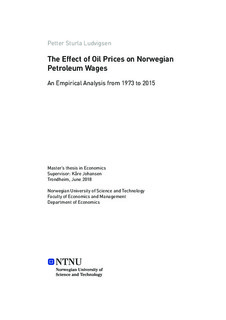The Effect of Oil Prices on Norwegian Petroleum Wages - An Empirical Analysis from 1973 to 2015
Master thesis
Permanent lenke
http://hdl.handle.net/11250/2565233Utgivelsesdato
2018Metadata
Vis full innførselSamlinger
Sammendrag
From the exploration of the first profitable oil field, Ekofisk, the Norwegian economy has been highly reliant on the petroleum sector. In 2017, the oil and gas industry accounted for 52.8% of total exports. With the economy depending on such a volatile commodity, it is intriguing to examine how it impacts sectoral wage formation. Therefore, this thesis focuses on how the development of the oil price has affected the petroleum wage development. Specifically, we focus on analysing short and longrun effects of the oil price. In the literature, the Norwegian wage formation is regarded as highly centralised. Theoretically, this implies that there is little scope for product prices to affect sectoral wages. However, when we apply an Error Correction Model to data stretching from the beginning of the oil adventure to present day, we do in fact find product price effects. We discover that the oil price accounts for around 14% of the long-run petroleum sector wage formation. The remaining share of the long-run wage formation was found to be determined by the manufacturing wage. Effects of the oil price in the short-run are absent, whilst we do find short-run effects of the manufacturing wage. The results are consistent and holds during several robustness checks. However, using a Granger-causality test, we detect some simultaneous effects between the petroleum wage growth and the manufacturing wage growth. This could lead to an overestimation of the results. The findings of this thesis are interesting because it challenges the view of a fully coordinated wage formation in Norway, and it suggests that the oil price is a driver in the petroleum wage formation.
